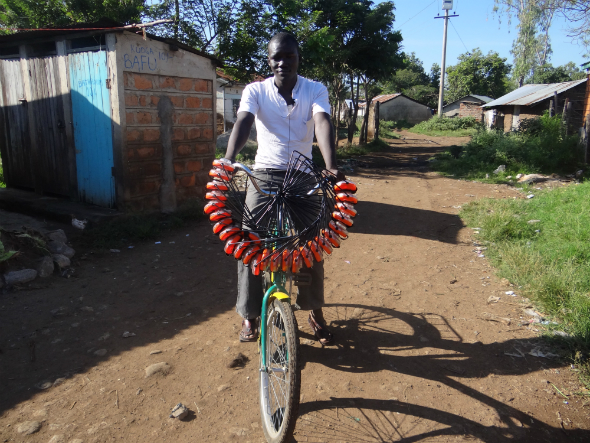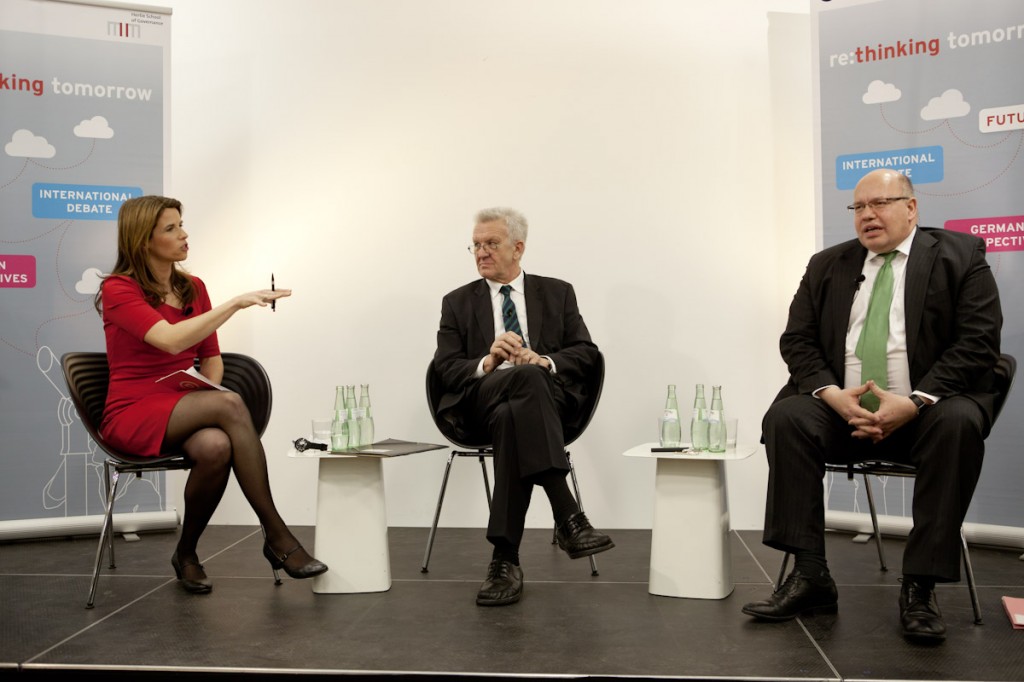Renting or buying – A difficult decision!

“Take a gap year and save the planet!” This could be the motto of the Kenyan based organisation “Ecofinder”. Founded in 1995 the Kenyan grass roots organisation helps communities around Lake Victoria to lead a more sustainable life. GLOBAL IDEAS has invited Nicolas, one of Ecofinder’s numerous volunteers, to write about his experience:
As a volunteer one of my main tasks is the so called “green energy promotion”. Here I try to drive the distribution of solar lamps forward. In this field we are running two different projects. The first one is called “Right Light”, it gives users of sooty kerosene lanterns the opportunity to rent a solar lamp over night for a very low price. So they don’t need to buy more expensive, health and environment damaging kerosen. The second project we call “Villageboom.” Here we encourage people to buy solar lamps as an investment in their future.
The major difference both is obvious, a person is either the owner of a solar lamp or the person rents the lamp. Both have advantages and disadvantages. For example: Almost everybody can afford the rent of one solar lamp for one night (about 9 Euro Cent). Another positive aspect is that the person who rents does not bear a risk if the lamp fails and is broken. But by possessing a solar lamp users can save a lot more money, because the sun will charge their lamp for free every day. Unfortunetaly for most of the people without electricity a good solar lamp is still very expensive.
In the long run renting a lamp will be more expensive than buying one. After one year of renting a lamp the rent will equal the value of buying a lamp twice. In conclusion I think installment payments are the best solution for poorest who are looking for a clean and cheap light. Therefore it could be very interesting and succesful to combine both concepts. For example our Solar Lamp Entrepreneurs-SLE could offer to their customers to buy a solar lamp bit by bit and not at once.
I’ll keep you updated how our solar lamp distribution is going on in future. But if you have any idea, suggestion or proposal about this issue feel free to comment and to share your thoughts.
In your opinion: “What is the best way to enable as much people as possible a solar lamp?”
Germany’s energy transition “biggest challenge since World War II”

How much should Germany’s “Energiewende,” a move towards ramping up renewable energy, cost? That question was the main sticking point at a lively debate on Wednesday between German Environment Minister Peter Altmaier (a member of the governing Christian Democratic Party) and the Green Party’s first state premier in Baden-Württemberg, Winfried Kretschmann. The discussion at the Hertie School of Governance was part of an ongoing series of events called “Re:Thinking Tomorrow.” The events are co-organized by Deutsche Welle, which is also a media partner.
The energy transition which involves phasing out nuclear and fossil fuels has sparked huge international interest and remains a hot-button issue in the country. In an interview with Global Ideas, Environment Minister Peter Altmaier said the transformation of Germany’s energy system “is the biggest challenge since the Second World War.” “It means a complete transformation of the backbone of Germany’s economy and business,” he added.
Altmaier went on to speak about the technical and financial challenges in scaling up renewables and phasing out nuclear energy as well as how Germany can build on its reputation as a pioneering power in green issues.
All about the German energy turnaround (Energiewende) – statement Peter Altmaier @ Hertie School from DW_Global Ideas on Vimeo.
Both Altmaier and Kretschmann are considered political heavyweights when it comes to climate and environmental issues, which made for some amusing and lively verbal exchanges. Kretschmann began by accusing Altmaier of unsettling voters. “People already mix up millions and billions,” he said, adding “and now you are talking about trillions!” That elicited quite a few laughs from the audience. A few weeks ago, Altmaier had said Germany’s energy transition would cost energy consumers up to one trillion Euros if certain measures weren’t taken such as putting brakes on electricity prices.
Both participants agreed that Germany’s energy transition has to be an ecological and economic success if it is to find wide acceptance both within Germany and beyond. Germany may only be responsible for three percent of the world’s CO2 emissions, they argued. But if it managed to successfully pull off its ambitious energy transition project and move towards a low-carbon economy, it could offer vital lessons for big polluters such as China. That’s why, they stressed, it remains important not to jeopardize the energy project.
Kretschmann said the energy transition had already led to green growth with jobs and opportunities generated in the renewables sector. To keep things this way, Environment Minister Altmaier said brakes had to be put on electricity prices. The turnaround has to stay affordable for everyone, he added.
Kretschmann underlined the positive effects of the energy turnaround in the future. In the long run, consumers will pay less for electricity, Kretschmann argued, saying “the sun, after all, doesn’t send you any bills.”
Students discuss the German “Energiewende” 5/5
Today, international students from the Hertie School in Berlin will be participating in a discussion forum with German Environment Minister Peter Altmaier and Winfried Kretschmann, the Green Party’s first state premier in Baden-Württemberg. The debate will focus on Germany’s “Energiewende,” literally an energy turnaround involving ambitious plans to phase out nuclear power and boost renewable energy.
Also today, we’ll be introducing the students taking part in the debate. Karina Campos from Argentina is our last candidate.
Karina Campos, Argentina from DW_Global Ideas on Vimeo.
When the samba is silent in Brazil
Global Ideas reporter Militiades Arsenopoulas came upon a few unusual scenes while filming in carnival-crazy Brazil.

Imagine you’re traveling to the carnival hot spot of Brazil and the festivities are canceled! That’s exactly what happened to me in Maceio, a seaside city in northeastern Brazil. No kidding! A few days before Shrove Monday, the mayor announced that there was no money for the carnival parade. The city was simply broke. It was a historic first and came as a rude shock to the city’s one million residents. Maceio is famous for its traditional carnival festivities that I so wanted to be a part of.
Other towns in the region also canceled their carnival parades due to the cash crunch, leading to a few strange scenes. For instance in Capela, a small town an hour’s drive from Maceio, a Volkswagen bus with huge loudspeakers on the roof drove slowly through the center broadcasting the mayor’s apology. I felt sorry for the Brazilians in that moment. But there was nothing they could do to save their carnival, the consummate Brazilian holiday and considered the best time of the year to visit the country.
In Maceio, I also met members of a local Samba school who simply blocked off a street (without the permission of the police) and started their own carnival party. Dancers in tiny bikinis and colorful costumes swayed to the Samba music played by young and old people on drums. The spontaneous street party was a vibrant and colorful spectacle. And that’s when I thought I understood what the Brazilian carnival is all about. It’s a celebration of the pure joy of living. I was so thrilled to experience the unique party. And I really hope people in Maceio get back their carnival parade next year.
Students discuss the German “Energiewende” 4/5
Tomorrow, international students from the Hertie School in Berlin will be participating in a discussion forum with German Environment Minister Peter Altmaier and Winfried Kretschmann, the Green Party’s first state premier in Baden-Württemberg. The debate will focus on Germany’s “Energiewende,” literally an energy turnaround involving ambitious plans to phase out nuclear power and boost renewable energy. Until tomorrow, we’ll be introducing the students taking part in the debate. Today: Harrison Epstein from the United States.
Harrison Epstein, USA from DW_Global Ideas on Vimeo.








Feedback